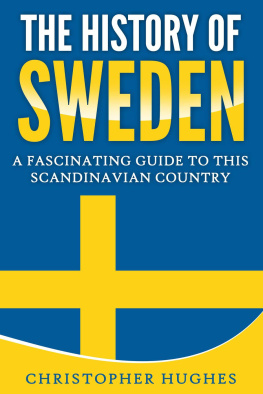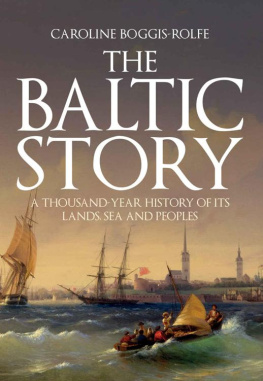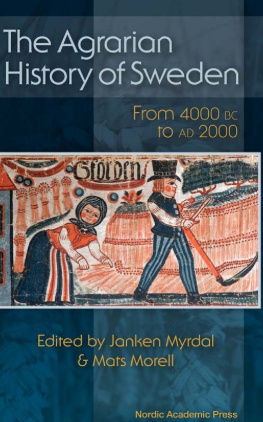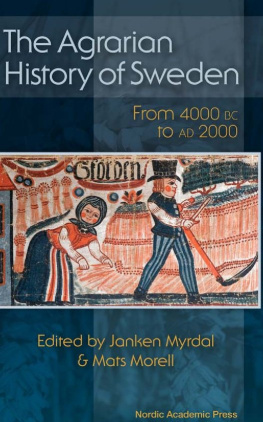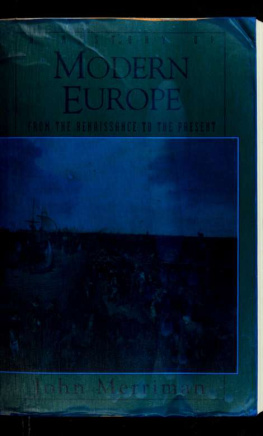Warrior Kings of Sweden
The Rise of an Empire in the Sixteenth and Seventeenth Centuries
Gary Dean Peterson
McFarland & Company, Inc., Publishers
Jefferson, North Carolina, and London
Excerpt from The Story of Civilization: Vol. 6, Reformation, by Will Durant. Copyright 1957 by Will Durant. Copyright renewed 1985 by Ethel B. Durant. (New York: Simon and Schuster Adult Publishing Group).
Excerpt from The Story of Civilization: Vol. 8, The Age of Louis XIV, by Will Durant and Ariel Durant. Copyright 1963 by Will & Ariel Durant; copyright renewed 1991 by Will & Ariel Durant. (New York: Simon and Schuster Adult Publishing Group).
Excerpts from Gustav Adolf the Great, by Nils Ahnlund, translated by Michael Roberts, published by Princeton University Press and The American-Scandinavian Foundation, 1940, The American-Scandinavian Foundation.
LIBRARY OF CONGRESS CATALOGUING-IN-PUBLICATION DATA
Peterson, Gary Dean, 1942
Warrior kings of Sweden : the rise of an empire in the sixteenth and seventeenth centuries / Gary Dean Peterson.
p. cm.
Includes bibliographical references and index.
ISBN-13: 978-0-7864-2873-1
1. SwedenPolitics and government17th century. 2. SwedenHistory, Military17th century. 3. SwedenKings and rulers17th century. 4. SwedenCivilization17th century. 5. SwedenPolitics and government16th century. 6. SwedenKings and rulers16th century. 7. EuropeHistory, Military17th century. 8. EuropeHistory, Military16th century. I. Title.
DL704.7.P48 2007
948.5'034dc22 2007005128
British Library cataloguing data are available
2007 Gary Dean Peterson. All rights reserved
No part of this book may be reproduced or transmitted in any form or by any means, electronic or mechanical, including photocopying or recording, or by any information storage and retrieval system, without permission in writing from the publisher.
On the cover: top Gustav Adolf the Great (British Library); bottom 2007 Clipart
McFarland & Company, Inc., Publishers
Box 611, Jefferson, North Carolina 28640
www.mcfarlandpub.com
To my grandparents,
Hannah Svensson and Peter Gust Peterson,
who immigrated to the United States
from Smland, Sweden,
and homesteaded in Montana
Table of Contents
Preface
As the grandson of Swedish immigrants I have always been interested in Sweden, yet in grade school, high school and even college, any Swedish history I learned I picked up indirectly. In Roman history there were the Goths, who may or may not have come from Sweden. There were Vikings, mostly Danish and Norwegian, who ravaged Medieval Europe and reached North Americamaybe. Swedish Vikings, I learned, did have something to do with the early Russian kingdoms. There was mention of Gustav Adolfs participation in the Thirty Years War and Swedens short lived colony on the Delaware. And that was it, except for some slurs about the countrys neutrality during the two world wars.
I had not an inkling that the boots of Swedish soldiers once trod the streets of Moscow, that Swedish generals had conquered Prague and once stood at the gates of Vienna. Only vaguely did I understand that a Swedish king had defeated the Holy Roman Emperor and held court on the Rhine, that a Swede had mounted the throne of Poland, then held at bay the Russian and Turk. I missed completely the history of another Swedish king who captured Krakow and Warsaw, then reversed direction and drove the king of Denmark into a last island refuge.
It was not until later, reading on my own, that I discovered the story of Swedens rise to power under Gustav Vasa (the first of Swedens great warrior kings) in the sixteenth century. I learned of Swedens military dominance of central and eastern Europe under her second great warrior king, Gustav Adolf, and Swedens pivotal role in the Great Northern War at the beginning of the eighteenth century under her last great warrior king, Karl XII, perhaps the ablest general of his day. For a hundred years Sweden was the international military power of Northern Europe, turning the Baltic into a Swedish lake, and establishing colonies in Africa and America.
This story fills a large void in history as it is generally presented to the American student and reader. First, it bridges a geographical gap between Russian history, readily available in book and course study, and Western European history, as taught in U.S. high schools. The annals of Sweden, Finland, the Baltics, Poland, Lithuania and Prussia are little understood by Americans. Yet events in this region directly affected the course of Western European history and ultimately that of America.
Secondly, this chronicle spans a period in time generally overlooked in American history books, literature, movies and television. Medieval Western Europe has been well represented in all these media. The American Revolution and the Civil War focus attention on the late 1700s and 1800s, but it was the political and religious movements of the sixteenth and seventeenth centuries that produced the climate for European global expansion including the exploration and colonization of the New World. And it was during these centuries that great strides were made in the advancement of weapons technology, warships and military tactics. Sweden was at the forefront of this military evolution, both on land and at sea. Besides playing a major role in these military, religious and political events of the era, Sweden took a hand in the colonization of America and continued to send skilled and industrious people to the United States well into the twentieth century.
In this book I present a narrative of Swedens age of greatness, in terms of her warrior kings, for the descendants of those immigrants, the posterity of immigrants of other Northern and Eastern European countries, students of military history, and the general reader interested in this neglected aspect of European history. A list of references, organized by chapter, is at the end of the book for the reader interested in a more detailed study.
I thank Sven Edenstrm of Ronneby, Sweden, for explaining details and filling in gaps, and especially my wife, Pauline, for long hours of editing and critiquing.
Here then is the story of Swedens age of greatness, a tale of intrigues and conflicts, of power and greatness, of suffering and courage, of romance and loyalty, of kings, nobles and peasants, the story of a people, a nation and an empire.
Introduction
The origins of Swedens warrior kings are buried in her ancient past, obscured by the mists of time. Only a vague outline can be constructed from archeological evidence and occasional references in literature from outside the country. These sources do provide enough information to paint a picture, though somewhat sketchy, of the development of the early Swedish people, their chiefs and kings.
At the height of the last ice age the Scandinavian Peninsula was pressed down under a massive ice sheet. About 13,000 to 14,000 years ago the ice sheet began to recede. As the ice melted the peninsula rose. Though the rising water from the melting ice cut off the British Isles from the rest of Europe and filled the Baltic Sea, Scandinavia rose faster than the oceans and is still increasing its height above sea level today. This elevating of the land mass means the coastline, rivers and islands of Sweden have been constantly changing during the countrys history affecting harbors, port cities and river outlets.


